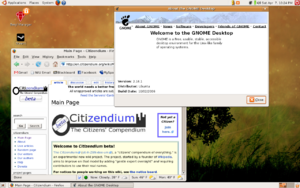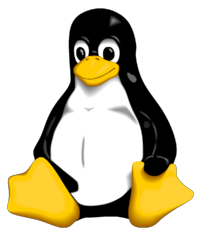Linux (operating system): Difference between revisions
imported>Joshua David Williams No edit summary |
imported>Joshua David Williams (added naming controversy) |
||
| Line 41: | Line 41: | ||
===GNU/Linux controversy=== | ===GNU/Linux controversy=== | ||
{{main|GNU/Linux controversy}} | {{main|GNU/Linux controversy}} | ||
By strict definition, it is rarely seen by the user, because its job is to be a layer between the user environment and the [[computer hardware|hardware]]. | By strict definition, it is rarely seen by the user, because its job is to be a layer between the user environment and the [[computer hardware|hardware]]. While first began his project, the [[Free Software Foundation]] (FSW), led by [[Richard Stallman|Dr. Richard Stallman]], was also developing a free operating system called ''GNU'', which is a [[recursive acronym]] for '''G'''NU's '''N'''ot '''U'''nix. The GNU system's development began with the necessary tools for the project, such as a [[compiler]] ([[GNU C Compiler]]) and a [[text editor]] ([[Emacs]]), and eventually began writing their kernel - that is, the core of the operating system - after they had finished writing the tools to place above it. Due to the very complex structure they chose to implement, however, the team had a very hard time getting the system to run. In effect, the GNU system became [[vaporware]], leaving free software enthusiasts to use Linux. Because the Linux kernel was usually used in conjunction with the tools the FSW created for GNU, the FSW refers to complete Linux operating systems as ''GNU/Linux''. This convention has been very controversial, however. Torvalds has made no effort to hide his thoughts towards this naming convention, however, saying that "calling Linux in general just 'GNU/Linux' I think is ridiculous."<ref name="OSWeekly">{{cite web | ||
| title=The "GNU/Linux" and "Linux" Controversy | |||
| url=http://www.osweekly.com/index.php?option=com_content&Itemid=&task=view&id=2242 | |||
| date=Retrieved April 6th, 2007 | |||
}}</ref> | |||
==References== | ==References== | ||
Revision as of 21:10, 23 April 2007
| Linux |

|
| The GNOME desktop on Ubuntu Linux 6.10 |
| Website: http://www.linux.org (unofficial) |
| Developer: The Open Source community |
| OS family: Unix-like |
| Source model: Open source |
| Supported platforms: x86, x86-64, ia64, DEC Alpha, Motorola 68k, SUN Sparc, ARM, PowerPC |
| Kernel type: Modular monolithic |
| Default user interface (most distros): GUI |
| License: GNU General Public License |
| Working state: Current |

Linux is, in its most general sense, open source operating system. It is Unix-like in the sense that the files are organized in a hierarchal file system and the average user is distinguished from the administrative accounts by an implementation of a very strict, yet capable set of permissions; thus, it is often considered to be a very secure system.
History
Linux was started in 1991 by a Finnish college student named Linus Torvalds. At the time, the majority of Unix systems were very expensive. The only affordable workstation environment was a proprietary system called Minix. Although the source code was included with this system, the license fee was still a bit pricey, and it was not as good as the systems the workstations in the universities were running.
The name
Originally, Torvalds had intended to call the system Freax, for Free, Freaks, and Unix. One of his colleagues did not like this name, however, so he named the system's FTP directory Linux in honor of its creator, with an x to denote that it is Unix-like.
GNU/Linux controversy
By strict definition, it is rarely seen by the user, because its job is to be a layer between the user environment and the hardware. While first began his project, the Free Software Foundation (FSW), led by Dr. Richard Stallman, was also developing a free operating system called GNU, which is a recursive acronym for GNU's Not Unix. The GNU system's development began with the necessary tools for the project, such as a compiler (GNU C Compiler) and a text editor (Emacs), and eventually began writing their kernel - that is, the core of the operating system - after they had finished writing the tools to place above it. Due to the very complex structure they chose to implement, however, the team had a very hard time getting the system to run. In effect, the GNU system became vaporware, leaving free software enthusiasts to use Linux. Because the Linux kernel was usually used in conjunction with the tools the FSW created for GNU, the FSW refers to complete Linux operating systems as GNU/Linux. This convention has been very controversial, however. Torvalds has made no effort to hide his thoughts towards this naming convention, however, saying that "calling Linux in general just 'GNU/Linux' I think is ridiculous."[1]
References
- ↑ The "GNU/Linux" and "Linux" Controversy (Retrieved April 6th, 2007).